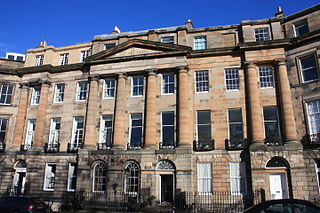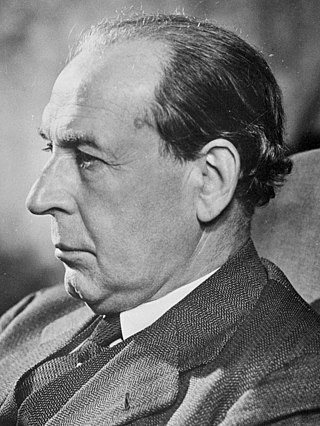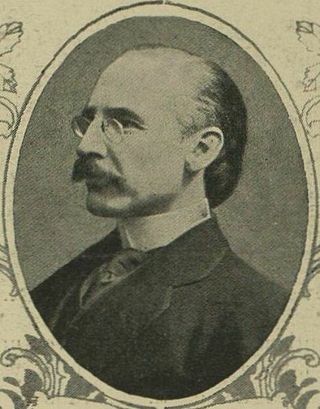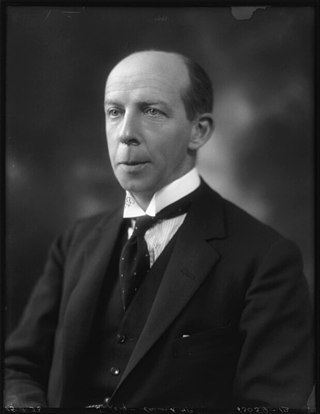Related Research Articles

The 1935 United Kingdom general election was held on Thursday 14 November. It resulted in a second landslide victory for the three-party National Government, which was led by Stanley Baldwin of the Conservative Party after the resignation of Ramsay MacDonald due to ill health earlier in the year. It is the most recent British general election to see any party or alliance of parties win a majority of the popular vote.

The 1931 United Kingdom general election was held on Tuesday, 27 October 1931. It saw a landslide election victory for the National Government, a three-party coalition which had been formed two months previously after the collapse of the second Labour government. Journalist Ivor Bulmer-Thomas described the result as "the most astonishing in the history of the British party system".
The National Labour Organisation, also known simply as National Labour, was formed in 1931 by supporters of the National Government in Britain who had come from the Labour Party. Its leaders were Ramsay MacDonald (1931–1937) and his son Malcolm MacDonald (1937–1945).

James Scott was a Scottish lawyer and Liberal Party politician.
The 1929 Kilmarnock by-election was a by-election held on 27 September 1929 for the British House of Commons constituency of Kilmarnock in Ayrshire.

The 1938 Combined Scottish Universities by-election was a by-election held from 21 to 25 February 1938 for the Combined Scottish Universities, a university constituency of the British House of Commons.

The 1936 Combined Scottish Universities by-election was a by-election held from 27 to 31 January 1936 for the Combined Scottish Universities, a university constituency of the British House of Commons.
The 1933 Kilmarnock by-election was a by-election held on 2 November 1933 for the House of Commons constituency of Kilmarnock in Ayrshire.

The 1936 Ross and Cromarty by-election was a parliamentary by-election for the British House of Commons constituency of Ross and Cromarty held on 10 February 1936. The by-election was triggered when Sir Ian Macpherson, a Liberal National was given a peerage. This enabled cabinet minister Malcolm MacDonald to return to Parliament.
The 1937 Holland with Boston by-election was a parliamentary by-election held on 24 June 1937 for the British House of Commons constituency of Holland with Boston.

Sir James Duncan Millar was a Scottish barrister and Liberal, later National Liberal politician.

Ernest James Young was a Liberal politician. He was a Councillor in Portslade and Member of Parliament for Middlesbrough East for one term in the 1930s. He was the first Headmaster of Harrow County School for Boys, Harrow, Middlesex from 1911 to 1919.

Edward Anthony Strauss was an English corn, grain and hop merchant of German-Jewish background. He was a Liberal, later Liberal National Member of Parliament.

John Leng Sturrock was a Scottish newspaper publisher and Liberal politician.

Sir Sydney Walter John Robinson JP was an English farmer, building contractor and Liberal politician.

Thomas Atholl Robertson was a Scottish fine arts printer and publisher and Liberal politician.

Harold James Glanville was an English businessman and Liberal Party politician.
The 1910 Rotherham by-election was a parliamentary by-election held for the House of Commons constituency of Rotherham in what was then the West Riding of Yorkshire on 1 March 1910.
The National Liberal Party, known until 1948 as the Liberal National Party, was a liberal political party in the United Kingdom from 1931 to 1968. It broke away from the Liberal Party on the issue of abandoning Free trade and supporting protectionism, and later co-operated and merged with the Conservative Party.
The 1935 Perth by-election was held on 16 April 1935. The by-election was held due to the succession to the peerage of the incumbent Unionist MP, Mungo Murray, Lord Scone. It was won by the Liberal National candidate Francis Norie-Miller.
References
- ↑ Leigh Rayment's Historical List of MPs – Constituencies beginning with "W" (part 2)
- 1 2 Who was Who, OUP 2007
- ↑ The Times, 27 January 1910 p4
- ↑ The Times, 26 October 1911 p12
- ↑ The Times, 23 October 1956 p13
- ↑ The Times House of Commons 1931; Politico’s Publishing 2003 p120
- ↑ The Times, 6 May 1929 p11
- ↑ The Times House of Commons 1929; Politico’s Publishing 2003 p131
- ↑ The Times, 15 August 1930 p14
- ↑ David Dutton, Liberals in Schism: A History of the National Liberal Party; I B Tauris, 2008 p40
- ↑ The Times House of Commons 1931; Politico’s Publishing 2003 p119
- ↑ The Times House of Commons 1935; Politico’s Publishing 2003 p147
- ↑ The Times, 24 December 1935
- ↑ The Times, 23 October 1956 p4
- ↑ The Times, 14 November 1956 p12